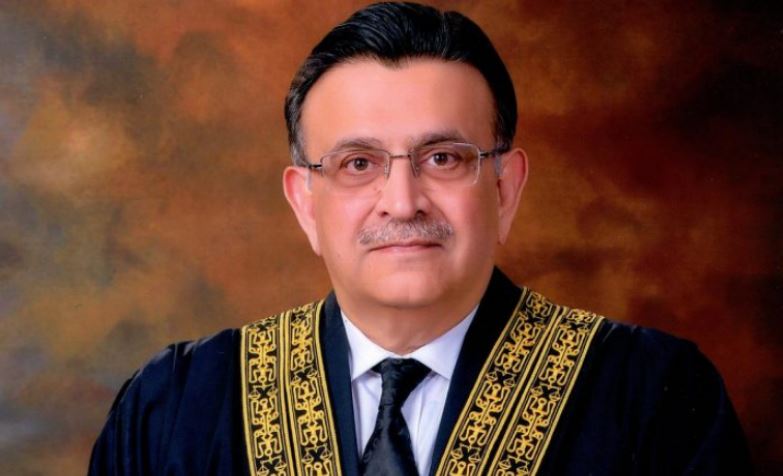Chief Justice of Pakistan Umar Ata Bandial remarked on Friday that Pakistan Army Act applied to civilians. A seven-member bench, comprising CJP Bandial, Justice Ijazul Ahsan, Justice Mansoor Ali Shah, Justice Muneeb Akhtar, Justice Yahya Afridi, Justice Ayesha Malik, and Justice Mazahir Ali Naqvi, was hearing a set of petitions trials of civilians in military courts.
The government had decided to try civilians under army laws after enraged protesters belonging to the Pakistan Tehreek-e-Insaf vandalised army installations following the arrest of their party chief.
The petitions, separately filed by PTI Chairman Imran Khan, former chief justice Jawwad S Khawaja, legal expert Aitzaz Ahsan, and five civil society members including Piler Executive Director Karamat Ali, have requested the apex court to declare the military trials unconstitutional.
During the hearing, CJP Bandial, while citing Justice Shah, said that the army is directly affected related to the matters like national security.
“Provoking serving army officer for conspiracy against national security was a serious crime,” CJP remarked, adding that reviewing Army Act clauses was not needed.
“It wasn’t correct to say that the civilians cannot be tried in the military courts ever. A civilian is tried in the military court if he incites the army for treason.”
It needs to be seen what method was adopted to bring civilians under the jurisdiction of military courts, and on which basis the anti-terrorism courtsent the cases to the military courts, he added.
At the outset of the hearing, petitioner Karamat Ali’s lawyer — Faisal Siddiqui — took to the rostrum and maintained that he had submitted a written statement.
“My petition is different from others. I have not challenged the Army Act and I do not contend that the civilians cannot be tried in military courts,” the counsel stated.
He said that the military trials of civilians had taken place earlier as well. At this, Justice Shah inquired why hadn’t he challenged the Army Act.
Responding to the query, he said that the trial of “favourite persons” or specific civilians under military laws was wrong and unconstitutional.
The counsel stated that he did not say that any clause of the Army Act was illegal, adding that a verdict against military courts in 1998 did not bring the Army Act under question.
At this, Justice Ayesha asked what principles had been set regarding the Army Act in other cases and what was the basis on which the civilians were being tried under the said law.
As per a report submitted by Punjab government, 81 women had been detained following the May 9 mayhem. Of these, 42 have been released on bail, while the remaining 39 are on judicial remand.
Moreover, the report stated that while 3,050 suspects had been found involved in incidents of vandalism following the PTI chief’s arrest, 2,258 detention orders were issued under the Maintenance of Public Order Act. Of these, only 21 are currently in jail.
Furthermore, the report added that 1888 people were arrested in the 51 cases registered under the Anti-Terrorism Act on May 9. Of these 1888, 108 accused are on physical remand while 1247 are in judicial custody.
Additionally, the identification parade of 33 suspects was conducted while 232 were released on bail. At the same time, 500 people were declared innocent and released.










